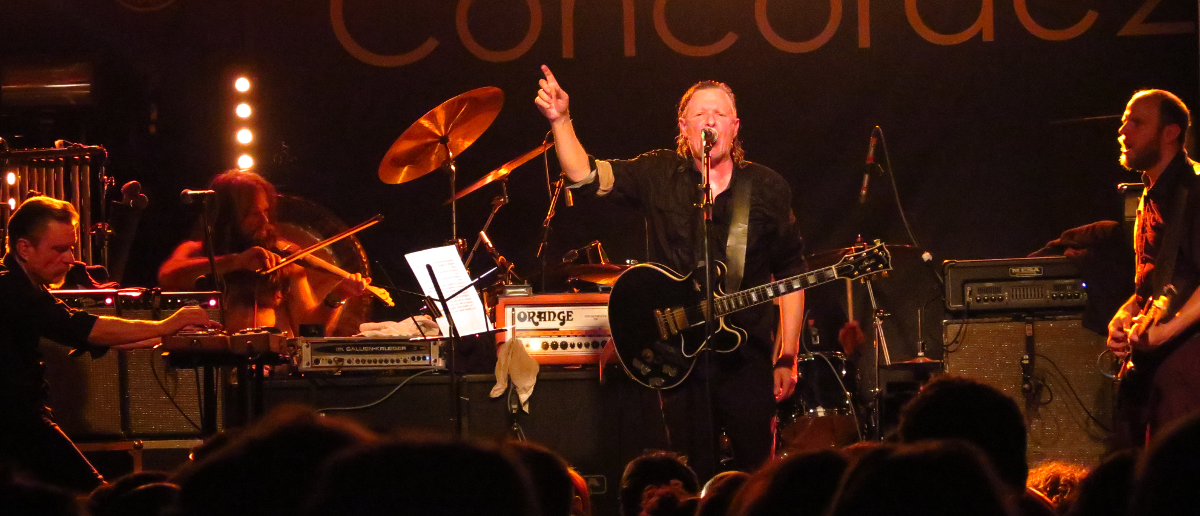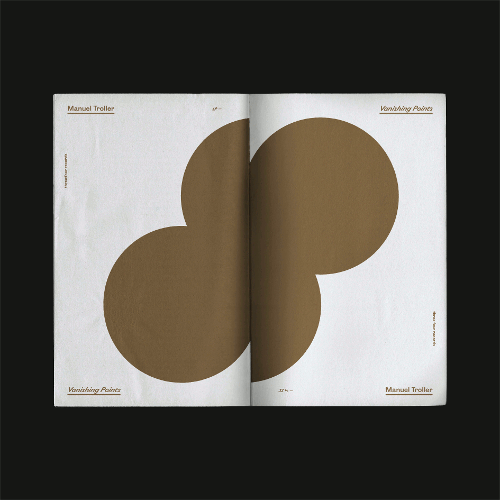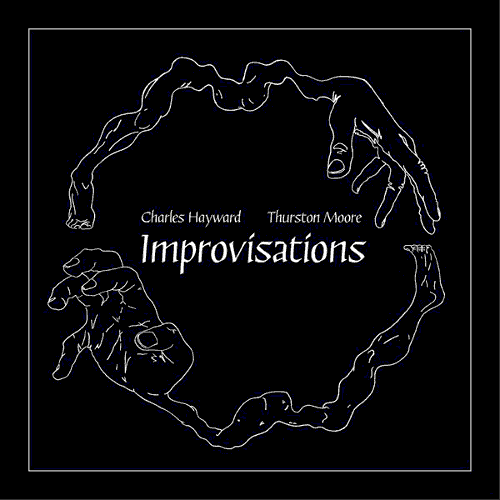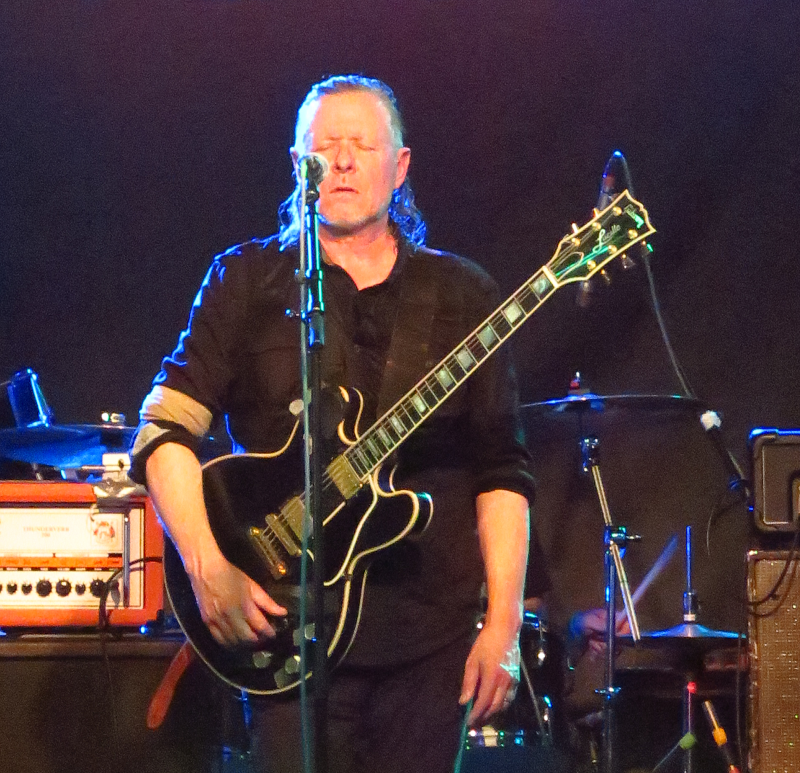 Brixton Electric
Brixton Electric
London
27 May 2014
Since reforming – or, perhaps more accurately, reincarnating – in 2010, Swans have rapidly become one of the most extraordinary musical entities of our age. Their comeback album, My Father Will Guide Me Up A Rope To The Sky, was a fine release, and they soon re-established themselves as a formidable live act. But with 2012’s The Seer – a vast, audacious, and stunningly wonderful double album – they scaled hitherto unconquered peaks, and matched that with a series of quite astonishing live shows which were about as close to holy communion as some of us are ever likely to get (see here for Jim Bliss’ review of one such gig in Dublin in 2013. I wasn’t there, but I saw them in both London and Brighton at around the same time, and Jim’s well-chosen words could equally have applied to either of those shows). Then earlier this year they released another magnificent double album, To Be Kind – it seemed almost inevitable that this would be a disappointment after the brilliance of The Seer, but miraculously it maintained that exalted standard, perhaps even improved on it. So anticipation was high for their return to London at the refurbished Brixton Electric (formerly The Fridge).
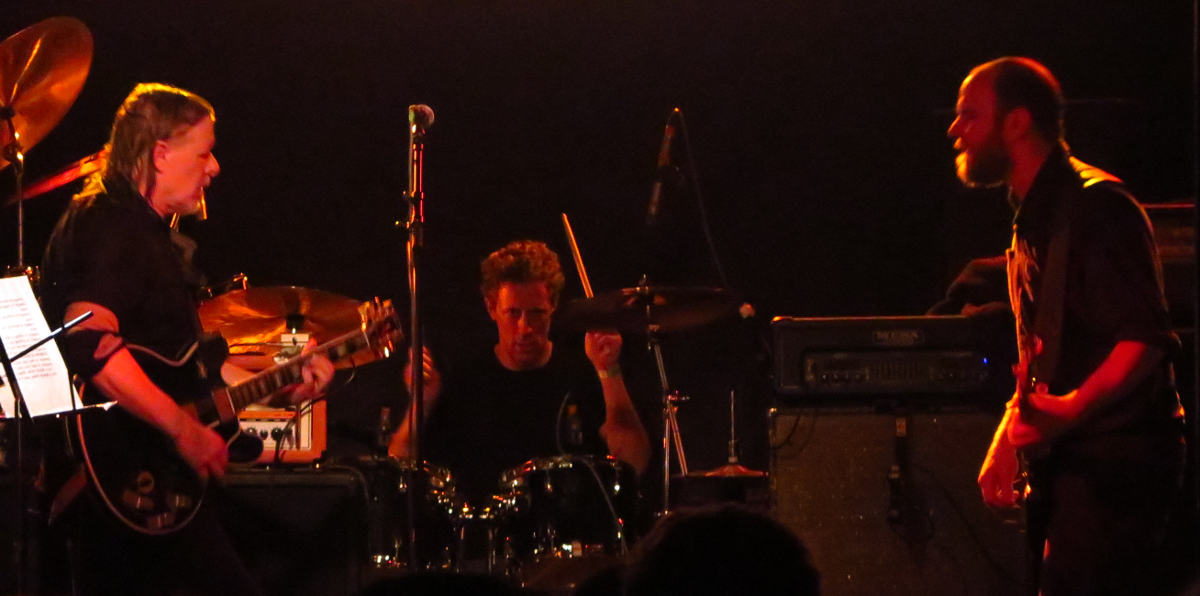
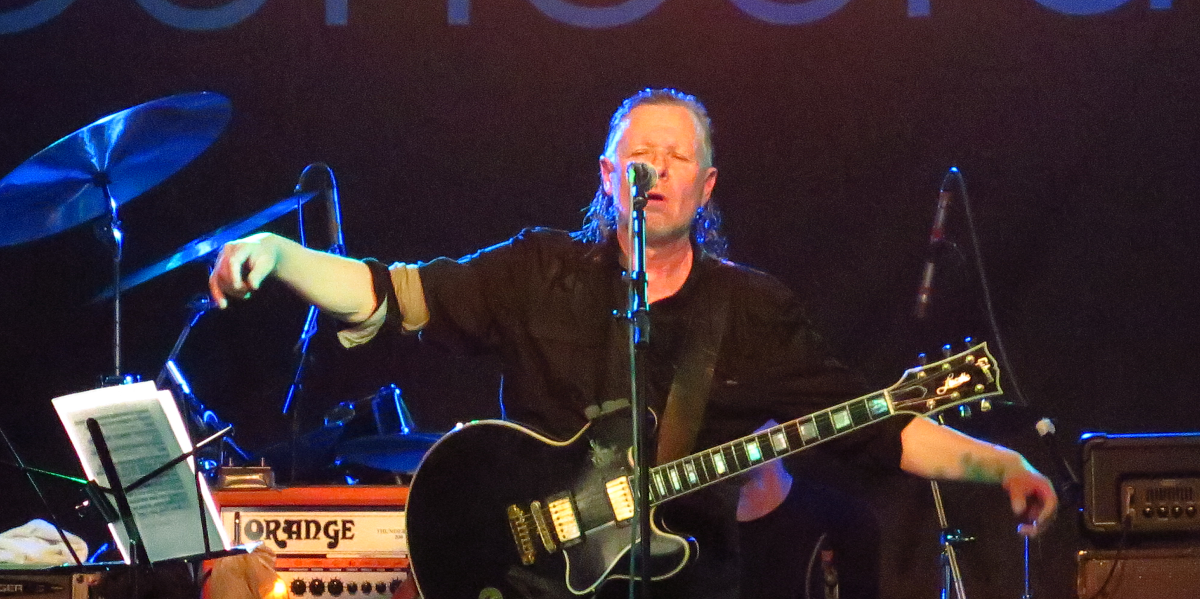
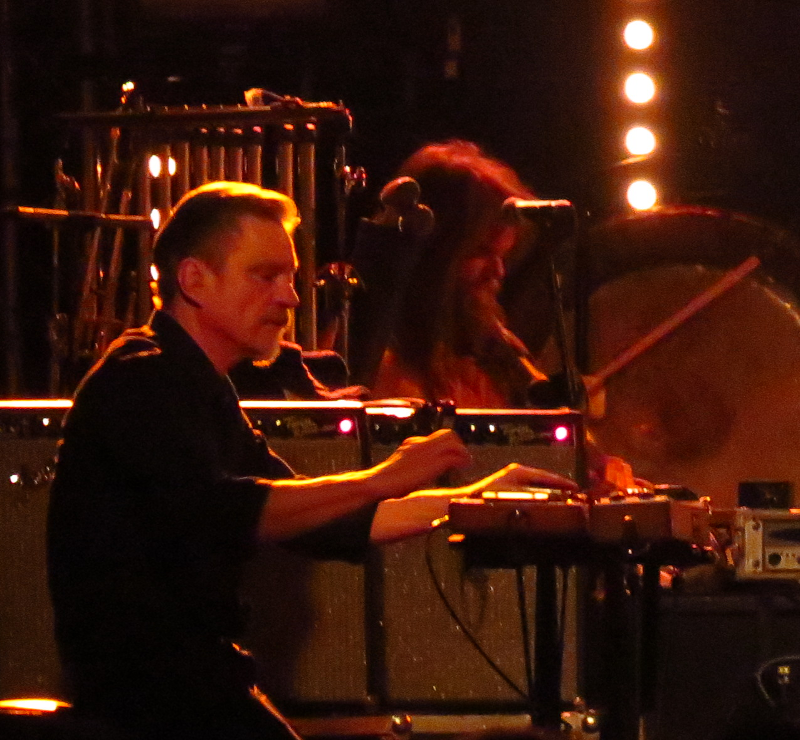 “Thank you so much,” says Gira in response to enthusiastic applause after “A Little God In My Hands,” before telling us “I want so badly to suck your cock.” He says this, of course, not in an impish ooh-aren’t-I-naughty way but rather with disarming sincerity, a simple statement of fact – apparently that’s just how he feels tonight. And with no need for further elaboration the band start the next song, which turns out to be “The Apostate,” my favourite track from The Seer and the only one from that album to get an airing tonight. Another slow-burning build-up leads into a juddering, squalling, rhythm monster with Gira’s shrieks of “Get out!” giving it the feel of an exorcism. It’s so remarkable that I find myself wondering, why doesn’t all music sound like this? Because, in fact, nobody else sounds like this. One can grasp at reference points: there are dirges and drones, echoes of some mutant industrial music; and tonight, more than in the past, there are propulsive, compulsive rhythms vaguely reminiscent of krautrock – but there really are no easy answers to the obvious question “what do they sound like?” beyond saying “they sound like Swans”. Most bands sound like versions of other bands – Swans are unimpeachably themselves. Their absolute confidence in this vast aural assemblage that sounds like nothing else on earth represents a collective act of enormous courage, and for all the talk of darkness and weight that usually accompanies any discussion of their muse, the fact is that it’s enormously, breathtakingly uplifting.
“Thank you so much,” says Gira in response to enthusiastic applause after “A Little God In My Hands,” before telling us “I want so badly to suck your cock.” He says this, of course, not in an impish ooh-aren’t-I-naughty way but rather with disarming sincerity, a simple statement of fact – apparently that’s just how he feels tonight. And with no need for further elaboration the band start the next song, which turns out to be “The Apostate,” my favourite track from The Seer and the only one from that album to get an airing tonight. Another slow-burning build-up leads into a juddering, squalling, rhythm monster with Gira’s shrieks of “Get out!” giving it the feel of an exorcism. It’s so remarkable that I find myself wondering, why doesn’t all music sound like this? Because, in fact, nobody else sounds like this. One can grasp at reference points: there are dirges and drones, echoes of some mutant industrial music; and tonight, more than in the past, there are propulsive, compulsive rhythms vaguely reminiscent of krautrock – but there really are no easy answers to the obvious question “what do they sound like?” beyond saying “they sound like Swans”. Most bands sound like versions of other bands – Swans are unimpeachably themselves. Their absolute confidence in this vast aural assemblage that sounds like nothing else on earth represents a collective act of enormous courage, and for all the talk of darkness and weight that usually accompanies any discussion of their muse, the fact is that it’s enormously, breathtakingly uplifting.
The acclaim is ecstatic, and the band members linger on stage for a while to soak it up and get their breath. Quite properly, there is no encore – such empty formulaic gestures have no place here tonight. Because this… this is for real.
-Haunted Shoreline-
*
Concorde 2
Brighton
2 June 2014
Right then. I’m going to start with my own personal bollocks because I think it’s important to get perspective right on these things. (And by ‘right’ I mean ‘narcissistic’, obviously). Swans’ revived live show has a pretty formidable reputation — justly, I’d say — but there are elements that irk me about it. First: ‘Unbelievably loud’. I imagine folk saying this never spent much time on the drum’n’ bass scene. Of course, if they did spend time at DnB nights, they were likely in the wrong state to remember quite how shredding the snares and basslines were (and probably still are, I’m just a bit old for dancing my balls off in darkened sweat-holes). Moreover, I’m pretty sure that Keiji Haino tends towards being more savage, volume-wise.
Swans are loud — aggressively so — but my earplug-less hearing was fine by the next afternoon after a few glasses of water. Trading Haino or DnB off with Swans is at least partly disingenuous, but I’m kind of talking about the position Swans occupy on the musical-cultural landscape. A big part of their reputation comes from who they are, and where they come from — in a sense, they’re the only no-wave/art-rock band that properly influenced a legion of metallers (Neurosis and all that). I’m pretty sure they weren’t ever fully committed to those axes (no wave/ metal) but there’s something in me that can’t help but see a pedal steel played in a non-conventional way and not take it as influenced by the slide-as-dissonance-generator of Glenn Branca, Mars, Sonic Youth and so on. Swans’ trajectory has been long and winding but there’s been consistency — repetition’s a big feature and a kind of brutalist dissonance too. There are bits this evening where I’m reminded of the kind of drilling, repetitious bass attack that Faust use – over and over with dissonant-ish intervals.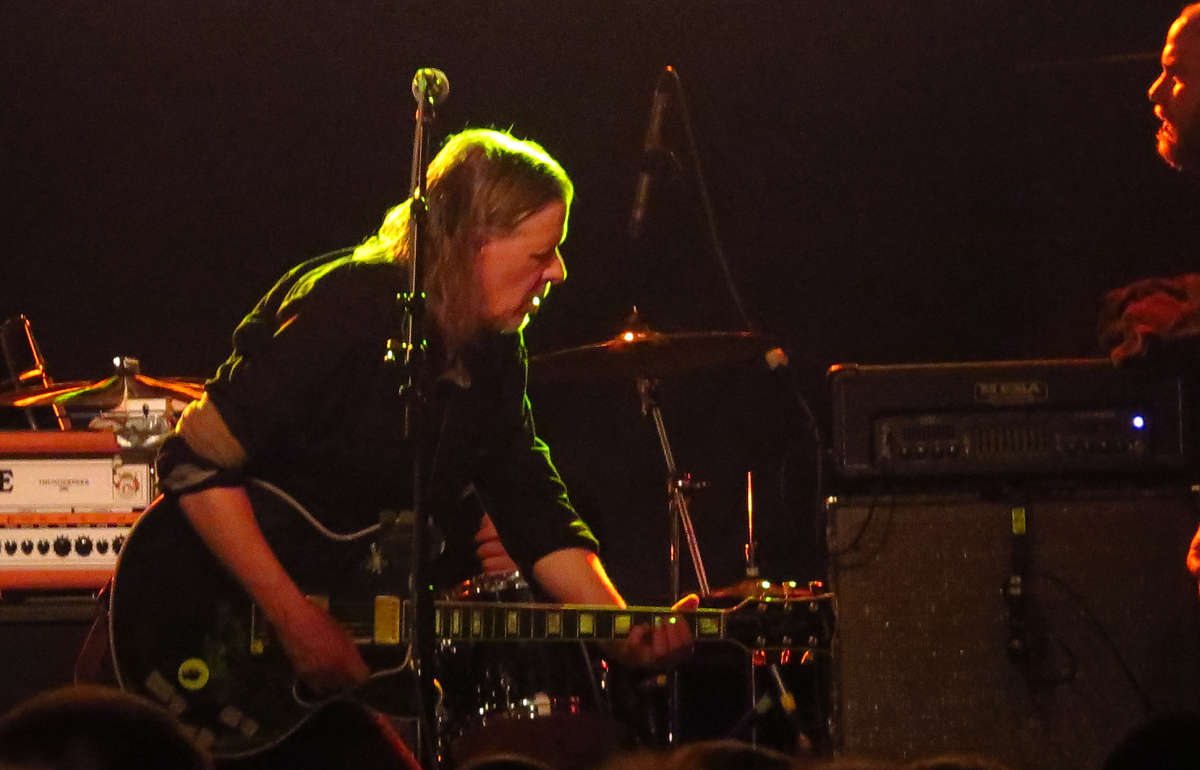 The ‘brutalist dissonance’ line is an important thing for me. In terms of live bands, I spend a lot of time watching noise, where dissonance is a pretty carefully deployed thing — lots of tight intervals and lots of careful choices (as few pure intervals as possible, or loads of stacked intervals). Elsewhere, we’ve got stuff from the avant-garde axis – Xenakis, always, but tone-clustery folk like Penderecki or Ligeti too. So when I say that Swans have a brutalist dissonance, I mean that it’s not that far into the brain-wilting intervals — mostly standard 7ths or 4ths. Fine, this is rock music, but it doesn’t quite make me feel queasy in the way I want. The general lack of developed modal work — it’s a tonic and an interval by and large — is amazing when it’s really drilled home on the longer songs (which puts them closest to someone like Faust in my mind-musical-map) but leaves me a little dissatisfied when it’s not sustained. And the rackety bits — the sections where they play ‘noise’ really aren’t that developed. The lap-steel of Christoph Hahn is pretty smart but often buried, and Norman Westberg isn’t the generator of the racket (he’s more of a slinky, supporting presence). Which means that you’ve got Gira basically sliding up and down in an octave-y shape. That’s fine, but it’s a pretty pugilistic way to generate noise — it’s light years away from metal but insufficient for a proper racket, in my eyes. I was speaking to a mate about this a couple of days ago, and he agreed — and the old rule of one person saying it makes it a prejudice, two makes it a cult abides here (or something — that sounded better in my head).
The ‘brutalist dissonance’ line is an important thing for me. In terms of live bands, I spend a lot of time watching noise, where dissonance is a pretty carefully deployed thing — lots of tight intervals and lots of careful choices (as few pure intervals as possible, or loads of stacked intervals). Elsewhere, we’ve got stuff from the avant-garde axis – Xenakis, always, but tone-clustery folk like Penderecki or Ligeti too. So when I say that Swans have a brutalist dissonance, I mean that it’s not that far into the brain-wilting intervals — mostly standard 7ths or 4ths. Fine, this is rock music, but it doesn’t quite make me feel queasy in the way I want. The general lack of developed modal work — it’s a tonic and an interval by and large — is amazing when it’s really drilled home on the longer songs (which puts them closest to someone like Faust in my mind-musical-map) but leaves me a little dissatisfied when it’s not sustained. And the rackety bits — the sections where they play ‘noise’ really aren’t that developed. The lap-steel of Christoph Hahn is pretty smart but often buried, and Norman Westberg isn’t the generator of the racket (he’s more of a slinky, supporting presence). Which means that you’ve got Gira basically sliding up and down in an octave-y shape. That’s fine, but it’s a pretty pugilistic way to generate noise — it’s light years away from metal but insufficient for a proper racket, in my eyes. I was speaking to a mate about this a couple of days ago, and he agreed — and the old rule of one person saying it makes it a prejudice, two makes it a cult abides here (or something — that sounded better in my head).
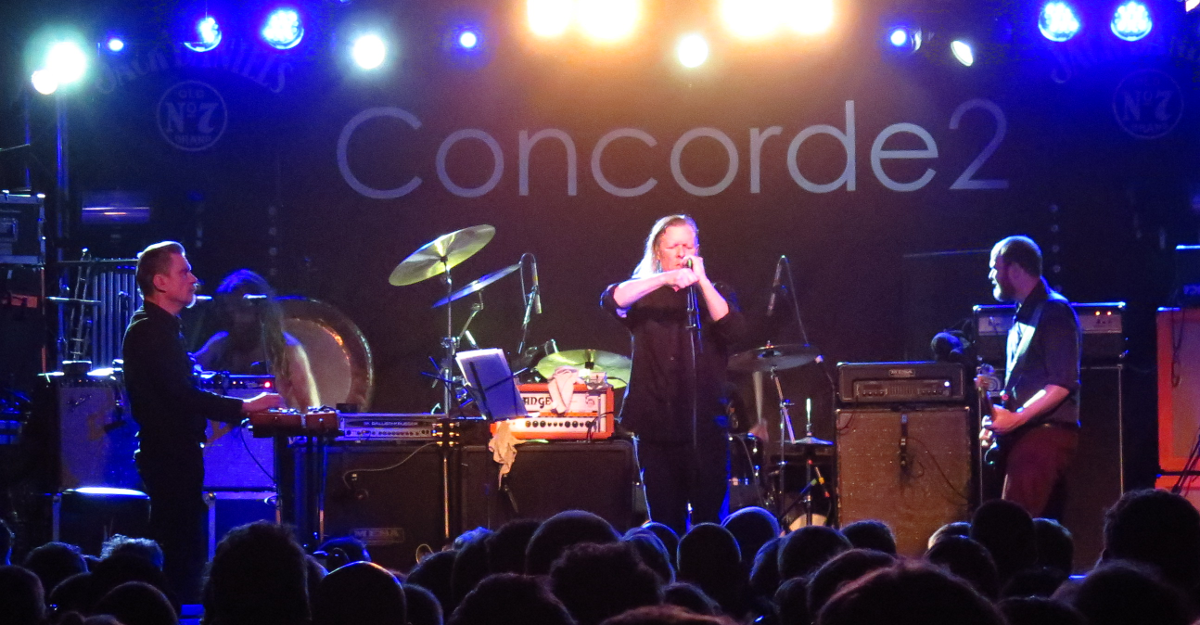
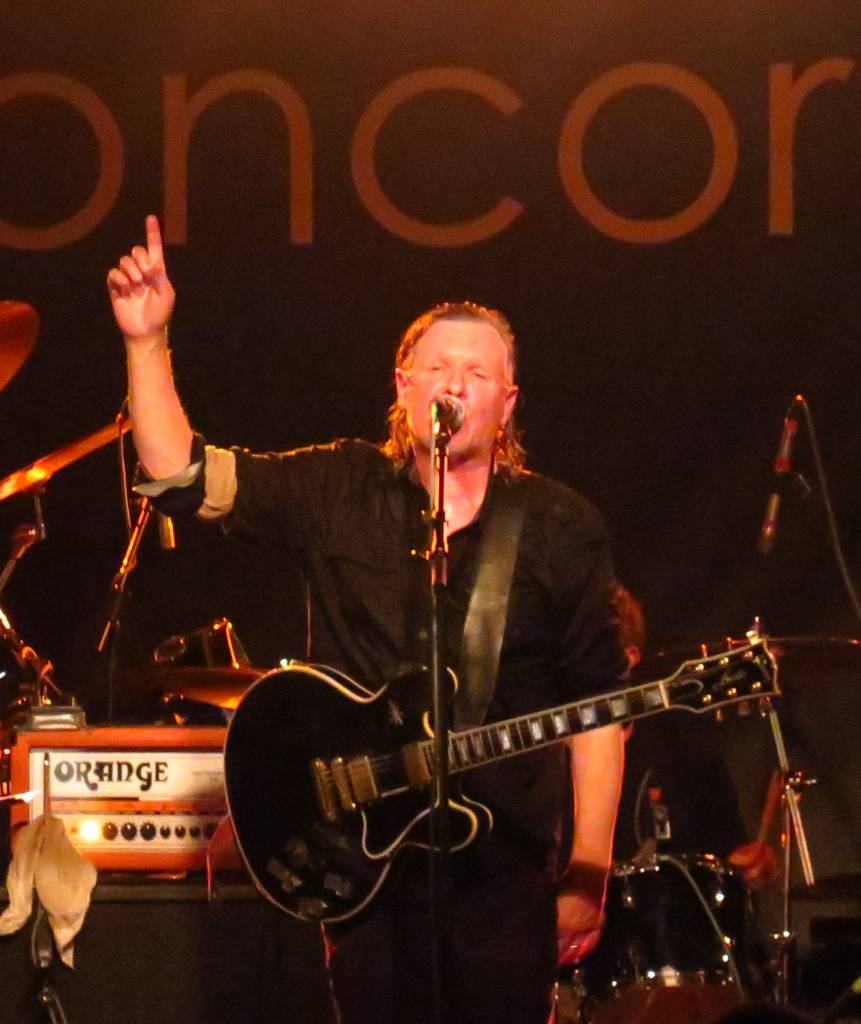 It’s just that they’re not playing Children of God. I love that record. Like, insanely so. The most perfect expression of old testament fury and confusion, agony and sufferance. Lyrically imperious, ambiguous, elliptical and opaque in just the right measure to GET the poetry of the old testament (something which never really worked for me, elsewhere, as a lyrical caprice). And modern Swans somehow lack that urgency. I think someone said after the gig that Gira was probably less of a well man during the ’80s and I suspect that’s true – while he’s clearly still fearsome/formidable, it’s more an act of confidence than borderline psychosis (the same borderline psychosis — or at least aesthetic occupation thereof — that empathises so completely with Abraham in my eyes).
It’s just that they’re not playing Children of God. I love that record. Like, insanely so. The most perfect expression of old testament fury and confusion, agony and sufferance. Lyrically imperious, ambiguous, elliptical and opaque in just the right measure to GET the poetry of the old testament (something which never really worked for me, elsewhere, as a lyrical caprice). And modern Swans somehow lack that urgency. I think someone said after the gig that Gira was probably less of a well man during the ’80s and I suspect that’s true – while he’s clearly still fearsome/formidable, it’s more an act of confidence than borderline psychosis (the same borderline psychosis — or at least aesthetic occupation thereof — that empathises so completely with Abraham in my eyes).
I’m still conflicted. If anyone asks, I’d say to go and see Swans because it is a seriously amazing live show. I’m just stopping short, cautious, because I’m convinced that this could (and has been) better.
-Words: Kev Nickells-
-Pictures: Al Robertson-
